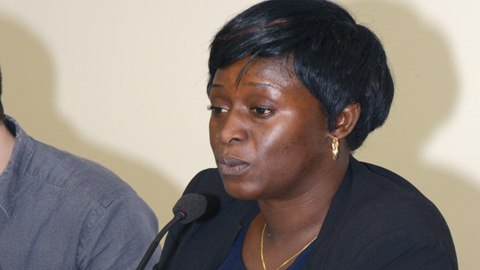"Women able to transform their pain into power will be tomorrow's leaders"
Caddy Adzuba offered the inaugural speech at the opening of the academic year of the UAB School for a Culture of Peace. She helped found the Association of Women Journalists of the Democratic Republic of Congo to condemn the cruelty suffered by women in her country.

"Women's bodies were used as a war strategy to destroy homes, families and the population"
-What is the current situation in the Democratic Republic of Congo?
-The situation has been very positive in the past few years, but there is still much to be done. The country has suffered this conflict since the 1990s. The war is coming to an end, but there are many fronts that are still open. It's a war within a war.
-How did this conflict begin?
-It began in 1996, after the country came out of a dictatorship and different countries participated in the process. It was a nightmare. Women were raped, there were robberies, plunders, child soldiers, etc. The eastern part of Congo became a ghost zone. You couldn't live there, you could only try to survive.
-How did all this affect women?
Their bodies were used as weapons of war. It was a war strategy used to destroy the enemy. To control the population, the rebels would break into a home a rape the women in front of their husbands and children. But it wasn't just any type of rape. Weapons and other objects were used, such as hot glass bottles, pistols and hand grenades, which they stuck inside their bodies and then made them explode. Pregnant women were cut open and their babies pulled out. And these women, the ones who survived, after all they had endured, culturally were unable to explain that they had been raped. It affected their lives, and their families, forever. It destroyed them: the husbands felt nullified by what had happened to their wives, the sons were taken by the rebels and turned into soldiers and the daughters kidnapped to serve as sex slaves.
-Has this situation changed?
This began to change in 2006, although there are foreign armies that continue to attack Congo: Rwanda, Angola, etc. because they want to control the areas rich in minerals and the oilfields. There is also an internal war for the control of armed groups. But it's difficult to stop these groups because they are funded by multinational companies interested in controlling the mines.
-You belong to an association of journalists. What did the association do to fight this situation?
We saw the need to publicly condemn the situation. We needed the international community to know the severity of everything that was happening. That is why we began to search for people who could explain their story on the radio: women who would share what had happened to them. It wasn't easy because these women felt ashamed and hid from us. We knew there had been sexual violence, but we did not know the severity of it. We created the Association of Journalists of Congo. The idea was to make people aware of everything that was happening. We discovered that since much of the media is directed by chauvinists we didn't have a voice, and so we decided to use part of our salaries to pay for advertising and explain the truth. Women associations and NGOs began to appear, each one specialising in a field (doctors, psychologists, lawyers, etc.), in order to help the victims of this war. We also began studying how the war had affected children and their childhoods.
-What were the results?
-Thanks to our efforts and all the reports, in 2006 a law was passed against sexual aggressions, making them a war crime, something which before that hadn't existed. The directives are important legal tools made to force the rebels to respect the resolutions, especially resolution 13/25. We created the City of Joy, a residence where women can come when they are discharged from hospital after being treated for these severe wounds. Normally they must undergo five operations. We have given our number to the women who live in conflict areas so they can call us and we can quickly send a team of doctors and psychologists after a rebel attack. However, we cannot reach everyone and that is why we asked for a National Plan that would make them abide by resolution 13/25. We are very happy because it was passed just two months ago!
-How would you describe the women who have suffered these attacks?
-We are working so that these women can transform their pain into power. If they achieve this, these women will be the leaders of tomorrow. The ones who survive are normally 15 to 30 years old. The older women and the younger one usually do not survive the wounds. A 9-year-old girl wouldn't be able to survive this. They need many medical interventions and suffer from severe psychological trauma.
-The multinationals that finance the rebel groups, the ones to blame for all this damage, have they been denounced?
-We have denounced it, but it is very difficult to stop. These multinationals only look to make money. They are the ones financing our governments, and the government of other countries around the world. If they were legally to exploit the resources of a country such as Congo it would be very expensive for them (they would have to pay taxes, fees, workers, etc.), and this way it is much cheaper for them. But reports from the United Nations verify that the multinationals are financing the war in Congo.